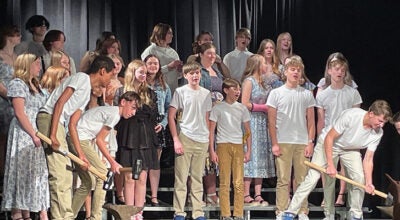MnSCU focused on poverty
Published 10:29 am Friday, February 5, 2016
By Josh Verges
St. Paul Pioneer Press.
At age 30, with a family of five to support but unable to continue working construction after an injury, Jacob Bernier enrolled at Century College in 2012.
His wife, An Garagiola, enrolled, too, after having been on bed rest for four years.
The couple has struggled with minimal income, relying at times on donated food. But unlike so many college students in poverty, they’re still working toward their degrees.
Both have counselors and instructors at the White Bear Lake college who have made them feel welcome and set them up with meaningful work-study jobs.
They are among the many students at Minnesota State Colleges and Universities schools benefiting from an emphasis on addressing basic human needs in hopes of improving academic outcomes for a growing low-income enrollment.
The assistance includes everything from work-study jobs and housing referrals to cash for child care and on-campus food banks. Many schools have retrained select faculty and staff on how to interact with students in poverty, as well.
“When students come from a background of poverty, there is this shift that they need to make in struggling to survive day by day to planning for their future. It takes time to make that change,” Garagiola said.
“I think a lot of students don’t have the support they need to get to that point,” she added. “Without mentors, we would not be where we are.”
Thirty-six percent of MnSCU students are eligible for income-based federal Pell Grants, up from 23 percent a decade ago.
Low-income students are much less likely to complete college. As the state’s largest higher education system, with some 390,000 students, MnSCU is starting to view poverty as a problem its leaders must address.
“This is Minnesota’s future workforce,” MnSCU Chancellor Steven Rosenstone said.
Rosenstone recently organized poverty training for the board of trustees, college and university presidents and MnSCU central office workers. And he has asked school leaders to consider low-income students a priority as they update campus diversity plans in the coming months.
“We have an opportunity here. We can either say we’ve had our kumbaya moment and wait for the next kumbaya moment, or we can actually do something,” he told the group of presidents and trustees last month.
Rosenstone said in an interview that he has had a keen interest in student poverty his entire academic career. It was at a poverty workshop during a conference last spring that he decided MnSCU as a whole needs a better understanding of what so many students experience.
One-third of MnSCU’s dropouts leave school because of financial stress, he said.
“Many of our students are one dead battery away from dropping out,” he said. “Hearing the stories of how students are struggling really impressed upon me that this needed to be something to take a deeper dive in.”
Beyond tuition cuts
Affordability has been a priority for MnSCU, with recent tuition freezes and a two-year campaign that raised $39.5 million for need-based scholarships.
Next, Rosenstone wants the system’s 31 colleges and universities to expand services for needy students and revise procedures to help those students succeed.
Night classes, for example, won’t work for a homeless student who at 5 p.m. each day needs to find a place to sleep, he said.
Donna Beegle, an Oregon-based consultant who grew up in generational poverty and led the training sessions, said needy students live with a day-to-day mind-set. She said long-term class projects can be overwhelming, and she encouraged instructors to break up assignments into smaller chunks.
She also criticized the common practice of locking classroom doors when classes begin. Instructors think they’re teaching responsibility, Beegle said, but a locked door tells a student who arrives late after a long bus ride that they aren’t welcome.
Beegle urged school leaders to appoint a poverty team to examine their practices and to ask students what they need to succeed.
“Go to the students. Listen to their voices,” she said. “They will tell you what’s in their way.”
Michele Jersak, a counselor at Century College, has been focused on poverty since training with Beegle’s organization in Oregon a few years ago. It was Jersak’s presentation at the MnSCU Frontline Conference last spring that caught Rosenstone’s attention.
Jersak said that when she was studying to be a counselor, she was trained to behave as the ultimate professional. But students who come from poverty need to see college faculty as people first, she said.
“It’s the exact opposite of what works for some of these students. They need to know you’re a human being,” Jersak said.
That’s a lesson for instructors, too, she said. Low-income students need to feel like they belong in college. Rather than starting the first day of class by handing out the syllabus, she said, an instructor should try something less formal, like a get-to-know-you exercise.
“Things that feel not academic make a world of difference for these students,” Jersak said.





